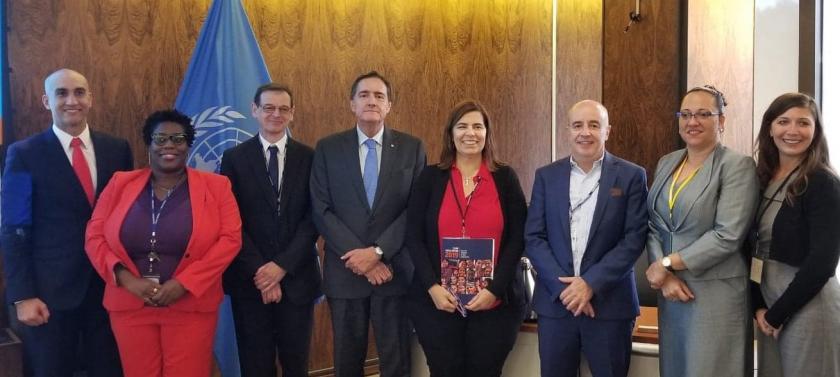Director of the Center for Health Informatics and iSchool Research Scientist Ian Brooks gave an invited talk on health informatics at "Celebrating 25 Years of the Core Health Indicators," a side event held on September 30 during the 57th Session of the Pan-American Health Organization (PAHO) Directing Council. PAHO is the regional office of the World Health Organization.
In his talk, "State of the Art in Information and Communication Technologies for Health Data and Information Management," Brooks briefed officials from the World Health Organization and Ministers' of Health from North, Central, and South America and Caribbean countries on recent developments in computing, social media use, big data, data mining, and artificial intelligence and how they could be used to improve public health policy decision making.
He gave several examples, including FluMapper from iSchool Affiliate Professor Shaowen Wang that uses geolocated tweets to show suspected flu cases. He also shared his own work on INDICATOR, an information system for monitoring the health of a community that combines hospital and clinic data with other data not traditionally used to monitor disease, such as school attendance, public social media posts and animal health. INDICATOR has been funded by the Carle Foundation, Centers for Disease Control and Prevention, U.S. Department of Agriculture, and Champaign-Urbana Public Health District.
According to Brooks, "When we have information systems for health that enable us to combine social media and other novel data sources with traditional health data and 25 plus years of core indicator data, and analyze it all with artificial intelligence, it is entirely likely that we will gain new perspectives on the health of our population and new ideas on how to help them."
Brooks' research interests include public and global health informatics, epidemiology, cyberinfrastrure, data analytics, and One Health. He holds a PhD in biochemistry from Bryn Mawr College, MS in applied and engineering physics from Cornell University, and BSc in biophysics from the University of York in England.

Pictured above: Julio Mazzoleni Insfrán, Minister of Health of Paraguay; Adrienne Cox, Unit Chief for Health Analysis, Metrics and Evidence, PAHO/WHO; Ian Brooks; Jarbas Barbosa da Silva, Assistant Director, PAHO/WHO; Paula Otero, Director of the WHO Collaborating Centre in Knowledge Management at the Hospital Italiano de Buenos Aires; Marcelo D’Agostino, Senior Advisor, PAHO/WHO; Cleopatra Jessurun, Permanent Secretary in the Ministry of Health, Suriname; and Jennifer Nelson, Specialist, Health Digital Solutions Inter-American Development Bank.
